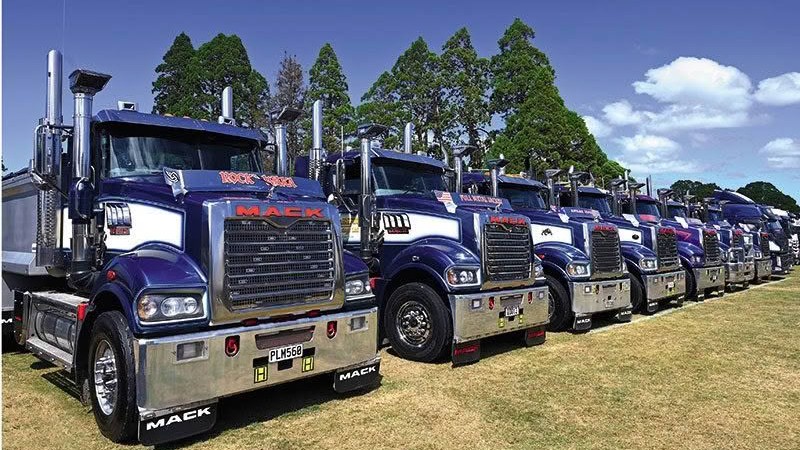
As retirement plans go, buying a haulage company doesn’t stand out as an easy option, but the couple who bought long- established Kāpiti company Clive Taylor Ltd are no strangers to hard work.
Three years ago, Andrew (‘Sooty’) and Tania Breach were living in Taranaki and working in the oil and gas sector – Sooty as a mechanic/crane operator on offshore rigs and Tania as operations manager for Wood Group Training.
The Labour government at that time had indicated its desire to overhaul the industry, banning future offshore oil and gas exploration. The couple realised their careers were no longer secure and started looking for a new venture.
Before moving into the energy sector, Sooty had extensive experience as a mechanic and driver. After leaving New Plymouth Boys’ High School, he completed an apprenticeship at the local Ford franchise and then worked for Ross Graham Motors, which had the contract working on Hooker Brothers Fleet (now MOVe).
During the 12 months Sooty worked there, he started driving trucks, a skill he needed for CoFs and road testing.
“I always wanted to be a truck driver, I guess, but it was really hard to get a truck driving job back then. I hassled Chris West of AR West Logging in Ōakura. I was employed as a mechanic/ truck driver there but, basically, drove during the week and then spent all day Saturday fixing broken springs and doing brake relines.” A highlight was contracting to Pacific Haulage in Gisborne, carting export to the Mount and bringing loads from Te Teko to the Gisborne Wharf.
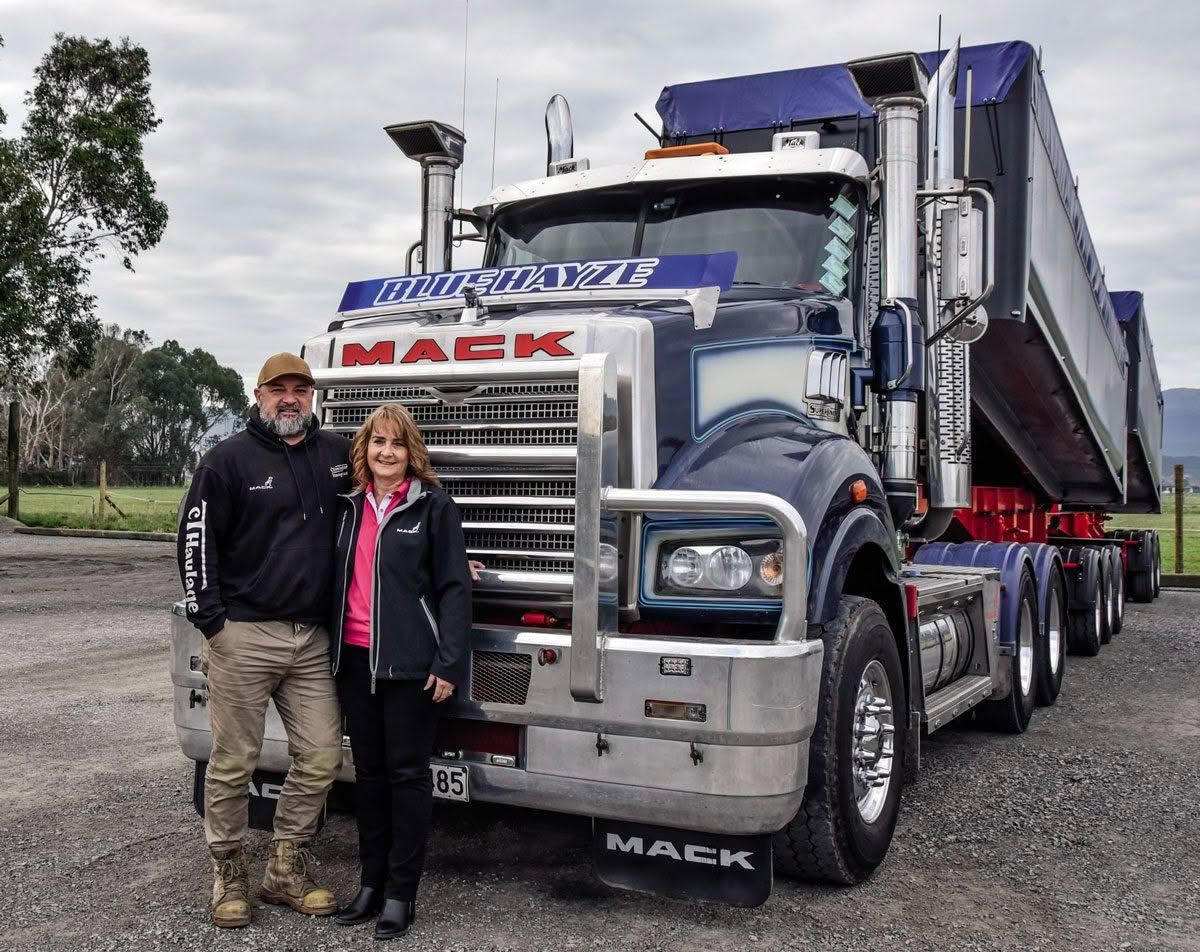
After 12 to 18 months, a job opened at McCarthy Transport when it started basing trucks in New Plymouth.
“I drove for Mark McCarthy for about 12 to 18 months, and then he bought AR West Logging, and all those boys came over. It was one big happy family.”
Sooty spent about four years working for McCarthy’s before deciding he’d had enough of logging and wanted to try something new. He then moved to JD Hickman. “I worked my way up from the shittiest truck to the flashest one. Then John put me in the office as a sales rep/manager to see if I liked that.”
Deciding he wanted to be an owner-driver, Sooty left in about 1998 and went to work for an owner-driver at Owens Tankers, driving a CH Mack. After 12 months doing fuel, he was offered a contract of his own and bought his first truck.
A change in company structure about six months later saw Sooty get a job at Hooker Pacific, carting LPG in the winter and hot bitumen and petrol in the summer. After a few years, the first of the big fuel crises came through, and he sold both his trucks to other owner-drivers internally at Hookers, finished the month, and did some part-time work for J Swap driving an alloy tipper.
A few friends were working on the offshore rigs and he thought he’d give it a go, paying to take a BOSIET [Basic Offshore Safety Induction and Emergency Training] course.
“I worked for Halliburton International for about six months or so as a labourer and went offshore on a couple of facilities and also a couple of land rigs. I loved it. Then I chased a job offshore on a rig doing exploration drilling just off Waitara.”
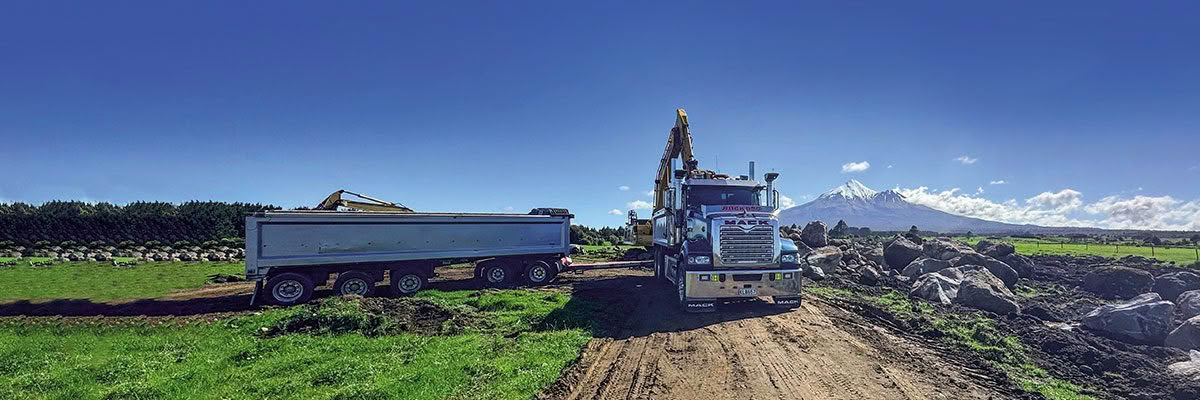
Sooty started as a roustabout, doing basic labouring, until a job came up as an assistant mechanic on permanent night shift.
“I didn’t know what the hell I was doing, to be honest, but I faked it till I made it! I was there for a couple of years, and when that demobbed overseas, we towed the rig to Nelson. Then I got on the heavy lift ship to Singapore.”
Sooty returned to New Zealand to find he had no job and no wife. Another offshore job came up, and he worked on Maui A and Maui B for about three and a half years.
“I had a bit of a claim to fame because I reckon I’ve worked on every offshore installation in New Zealand – 107 and Kupe and a couple of others. It was a good life.”
From there, Sooty went onto an FPSO – a floating production storage offtake vessel – working as a mechanic for a couple of years before moving onto the platform a kilometre away as a mechanic/offshore crane operator.
By now, Sooty and Tania were a couple, having met while working in the same industry.
Born in Lower Hutt, Tania grew up in New Plymouth, doing a business and office skills course when she left school.
“I ended up working for an accounting firm, which I hated. I went and worked in Australia for a year before coming back and working for the Union Steamship Company based at Port Taranaki. Another part of the business was New Zealand Offshore Services, and that was when I first got into the oil and gas industry.”
At the time, the Maui B was being built offshore and the company Tania worked for supplied the labour, catering and marine crew for the project. She worked in the industry for about seven years before leaving and having her children. She returned to the industry when her youngest was two and worked for another offshore company as crewing manager. Each offshore oil rig had approximately 60 people working on it.
“I looked after various offshore platforms and rigs, and it was a pretty cool job. It took me to some amazing countries around the world, taking guys to join a ship or a rig before it came down to New Zealand. It took me to Panama and Central America, South Korea, Singapore, Noumea, Cairns, Hawaii, and Seattle in the States. I looked after the guys and their rosters as well as their training, their flights, accommodation, transfers out to the rig by helicopter, everything.”
Tania says that’s where she developed her passion for training. “It was like a big jigsaw puzzle that you had to put together to get a guy offshore and to his rotation, organising all that as well as liaising with them on the HR side of it as well.”


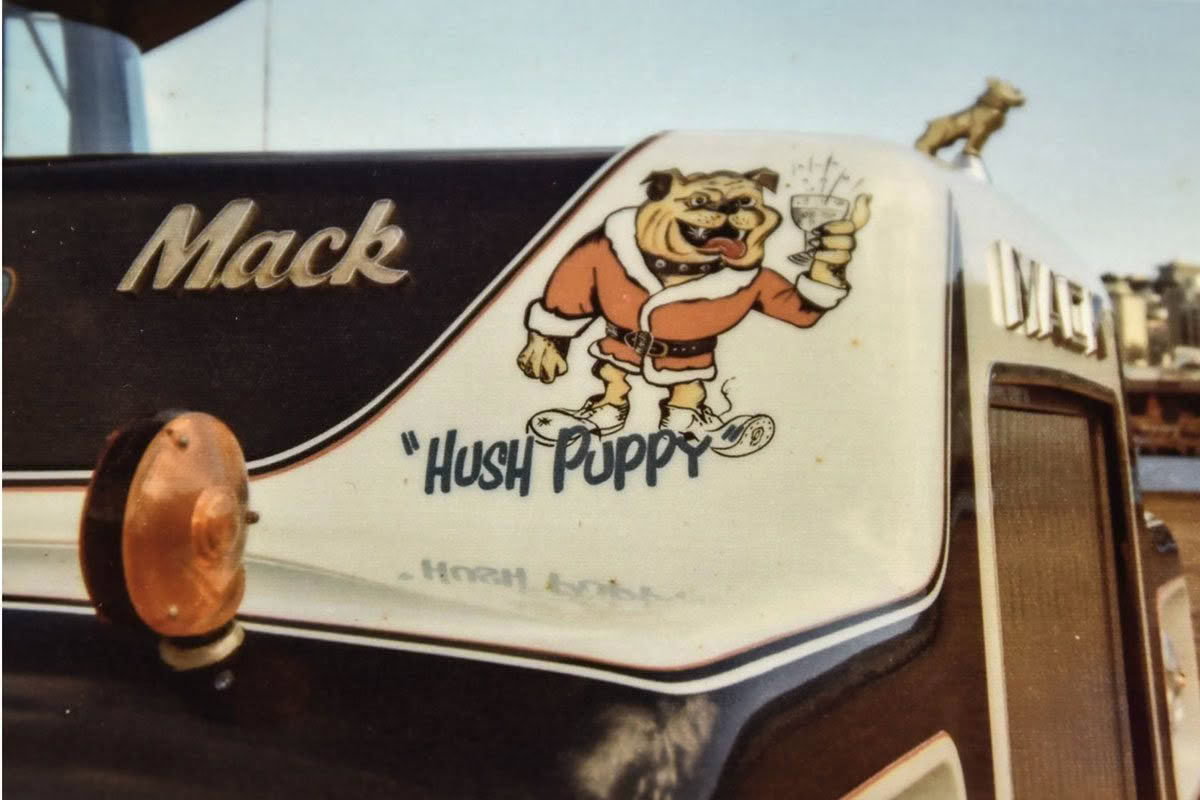
Tania spent most of her career in the energy sector, but in 2016, she was made redundant. She spent six months working for another offshore company looking after a dive support vessel, before gaining a job at Wood Group Training in New Plymouth.
The company is a major provider of safety training and consultative services to the oil and gas, energy, food processing, transport, construction, engineering and manufacturing, marine, aviation and government sectors.
“They did helicopter underwater escape training in their marine training centre, and they had a huge hot-fire training centre too. There was also training in first aid, heights, confined space entry, gas testing, you name it. I was operations manager there. I basically coordinated all the training staff and the resources that they needed and rostered them on for the training courses.”
Tania worked there for five years until Sooty, having seen the writing on the wall regarding the direction the government was heading, started looking for a new adventure. “I thought about going back to truck driving as an owner-driver and looked at logging contracts,” he says. “I carried on working and then a mate of mine down in Paraparaumu said that Clive Taylor was for sale and thought I’d come down and have a look.
“I came down on my own and my mate dropped me off at Clive’s yard, and we had a bit of a chat. He had all this stuff written down on a piece of paper by hand and that was the complete list. ‘This is how much it’s valued at. If you want it, go and find some money!’”
Sooty says he couldn’t understand why the well-respected company had not had people fighting over it.
“That was my biggest fear – he had capable truck drivers who had their own businesses who could have invested and taken it on but none of them did. And that was the biggest thing, I thought, ‘Why not?’”
Sooty looked at what was on offer and accepted the challenge of buying the company, taking over on 1 February 2021.
“Clive was very good to deal with; it was a handshake – old-school stuff. That suited us, and it suited him. So we trotted off and tried to find some money and bloody ripped into it, and that was pretty much it.”
Tania carried on working in Taranaki for about six months until they realised the business needed both of them on deck in order to grow.
“We’ve taken the business from a company that had pretty much nothing in place for HR or health and safety, to where we are today. We started from scratch. We had three drivers and nine trucks when we bought the business off Clive. In the space of three years, we’ve now got about 20 trucks and 17 drivers.”
Highlights from Sooty’s early driving career, staring with the International Transtar he drove for AR West; the Kenworth K100E and ERF E-Series he drove for McCarthy Transport; an early Kenworth Aerodyne imported from America, which he drove for JD Hickman; the Mack CH he drove for Owens Tankers; and the Kenworth T404 at Hooker Pacific. Photos: Breach collection.
Sooty says when they took over there were only a few clients – one of which was Higgins – and worked mainly on the local expressway projects.
“We’ve grown the business. We’ve got a good customer base now. My whole focus was finding work outside of that while still trying to maintain that good service to Higgins and Fletchers, which I felt we did.
“We have this policy of ‘don’t say no’ to anyone; the phone rings, we say ‘yes’ and figure out how to do it later on, and that worked well for us. One day, I was looking at the two later-model trucks I bought off Clive. One was an alloy unit, the other a Hardox unit and I thought, ‘The Hardox one is carting rock, that’s the way to go.’ So that’s what we put on the road.”
He says it made sense, because hardly anyone has an aluminium unit in Wellington – they’re mostly truck-only in construction and civil work.
“I imported two high- kilometre trucks out of Australia because, at that time, it was taking anywhere from 18 months to two years to get a truck. So we imported our own with Murray Sowerby. He brought them in for us. We got bins made and got them all painted and tidied up and they’re still working today. They’re good trucks.”
Not long before the couple bought the business, Clive had sold Rock Dog – an eight-axle 2017 Trident tipper – and one of the first things Sooty did was repurchase it and return it to the fleet.
Sooty and Tania retained the Clive Taylor name, but added the word ‘Haulage’. Sooty says the Clive Taylor brand was good. “We’re never going to change it, and we never wanted to. It was always going to stay Clive Taylor, and he was more than happy with that.
“Even when I was an owner-driver, I never had my name on the side of my trucks. We’re not here to have a legendary status or make a name for ourselves. We’ve got a small window to be successful here – 10 or 15 years – and then the place is going to be sold. We’ve got to try and do everything right that we can in the small window we’ve got.”
They also kept the signwriting the same, including the company name on the back in red. Tania says Clive gets phone calls and texts and pictures from his mates who see his trucks on the road. “He’s reminded constantly and he’s stoked.”
Driver Andy Maynard moved into a role as operations manager when the company changed hands. “He was just one of the boys when we bought the company. Him, Les Addis and CJ were the longest- standing drivers,” says Sooty.
“They weren’t that busy, doing bits and pieces, so I said, ‘The whole focus is for you guys to be out driving your trucks. I don’t want to see you in the yard.’ It wasn’t really that hard to get them busy and motivated. Andy showed an early sign that he’d like to be in the office or dispatching when we interviewed him, and he’s been steering his career in that direction.
“With all our staff, we give them the tools to go and do the job and we expect them to self-manage. They get a good idea of what’s expected and we try to keep out of their faces as much as we can, and let them go out and do the job properly.”
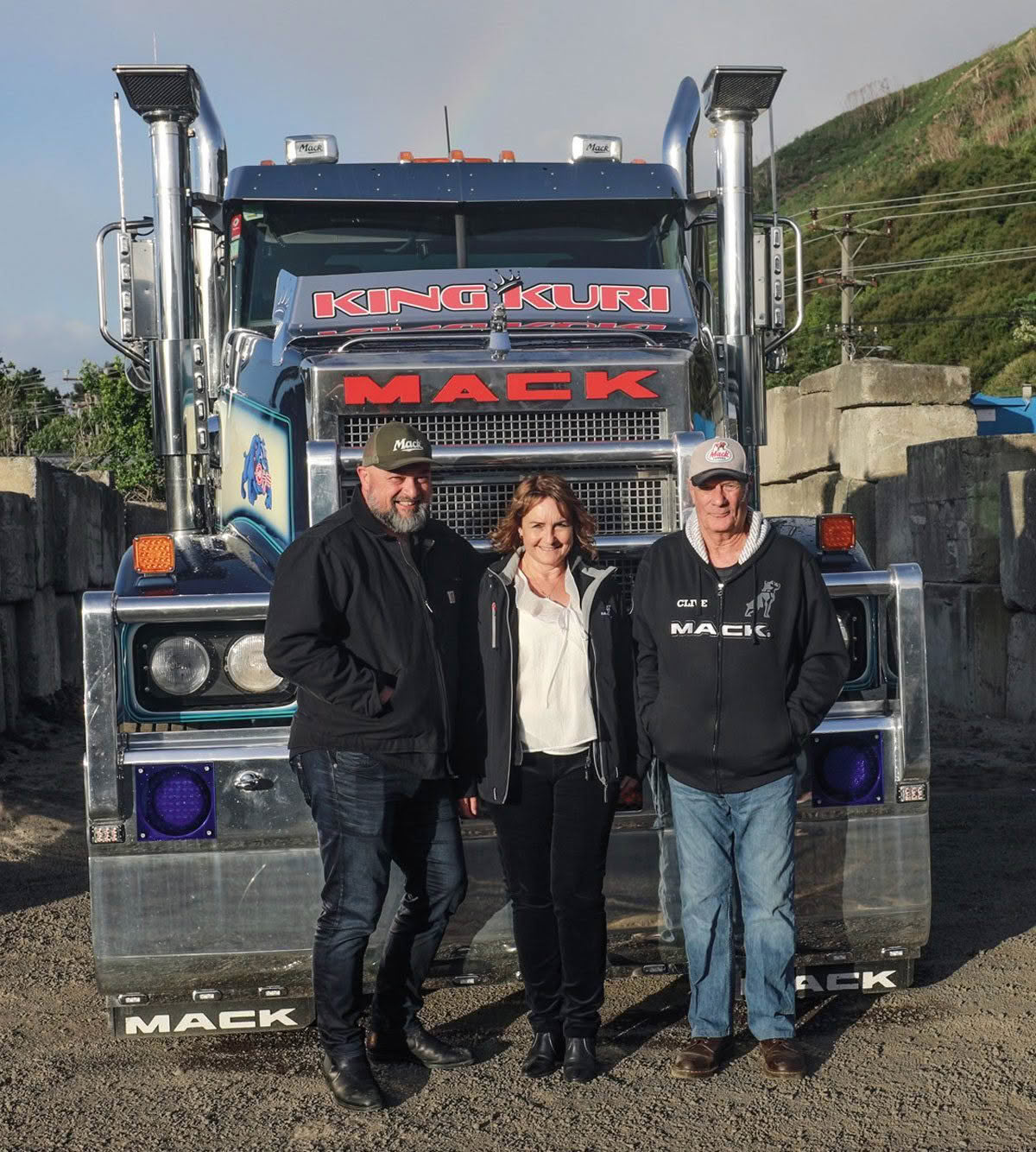
Sooty says as the company started getting busier, they employed a driver to replace Andy. “We got Andy into a management/truck driver role for starters, which he’s embraced. We’ve just worked with him from there and he’s full-time off the road now.”
The couple say that the business wouldn’t be where it is today without Andy’s help, input, local knowledge and contacts.
With Tania’s background, instigating robust health and safety practices was a priority. “I started with the basics, getting some good practices under way. Toolbox checks and safe operating procedures and training were the big things. The guys didn’t have any training. They didn’t have first aid or what I would call basic practices, so I started from the ground up, really.”
Sooty says their first health and safety meeting was around the barbecue table out in the shed. “We printed off all the topics we were going to talk about and they all sat there and looked at it and thought, ‘What the hell’s going on here?’ We gave them our safety manual so they could all read it and understand that this is where we’re heading, what we’re doing.”
Tania says the key thing is that everyone – and she singles out Andy in particular – really embraced it, despite having come from a background where there had been nothing in place before. “With our backgrounds, that’s the first thing you do,” says Sooty. “You have a meeting, you have a chat, you have a hui, then go do the do-ey, and it’s grown from there.”
The company has also moved from a paper-based job docket and timesheet system to digital.
“Judith, our awesome accounts manager, was part- time with Clive and she’s now full-time with us. We would be lost without her attention to detail and expertise. She’s really embraced that as well, going from that paper-based system to what we use now – MyTrucking for all our job allocations to EROAD on all the vehicles, and we do inspections using the EROAD inspect app. We use Safe365 apps for accidents or safety observations – the list goes on. Everything now is pretty much based off the guys’ phones, their time logs, incident reports, everything,” says Tania.
The company is Tōtika- accredited for health and safety pre-qualifications, and Amotai- registered because Sooty has whakapapa links to Ngāpuhi.
Tania says the couple is keen to get class 5 drivers into the industry, training them up if necessary. “We don’t have anyone we’re training at the moment. We’ve actually got a really plentiful supply of drivers and lots of applications every week from people looking for jobs with us, so we’re very lucky. I think we get quite a following with the Mack branding and the Mack trucks. The average age of a truck driver is 57, and the majority of our guys would be in their 30s.”
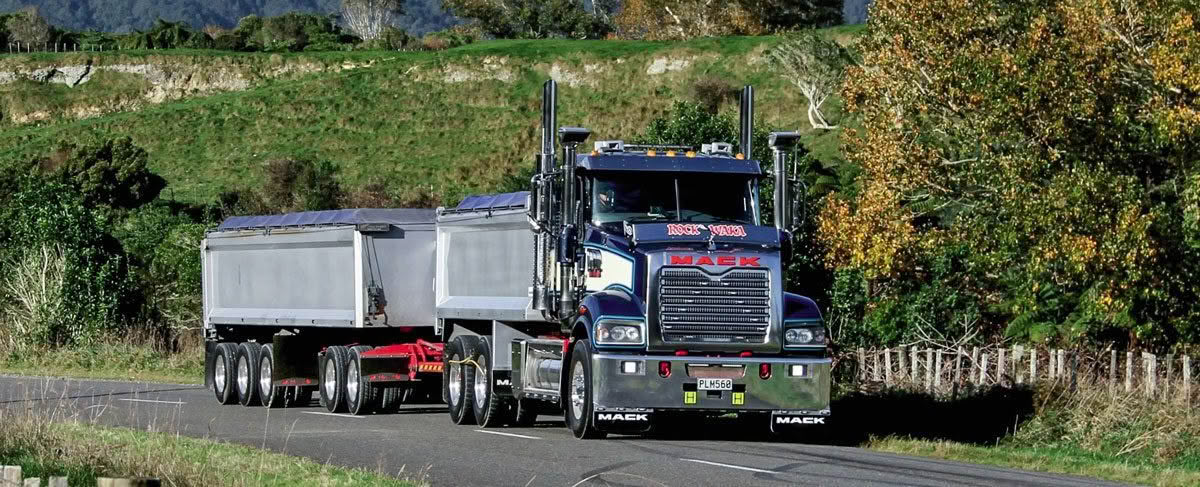
The next big project in the pipeline is the Ōtaki to north of Levin Expressway construction, expected to start next year.
“That’s what everyone’s waiting for,” says Sooty. “We were sitting in the motorhome that night when we were umming and ahhing whether to buy this place and there was an article on the 6pm news about the next section. We were months away from buying the place, but they said on the news that Ōtaki to north of Levin would be getting under way. We thought, ‘Right, that’s our ticket’. And now we’re sitting here waiting, four years later.”
Sooty says he hadn’t realised the downturn in the industry was going to have such a long- lasting impact. “We should have reacted probably from a business side of things a little earlier. The plan towards the end of last year was to zone in on our fleet, get rid of the old gear and just look for efficiencies. Now, it’s more of a requirement than a wish-list. It’s very hard and only getting harder.
“We’ve got a great team, great drivers, who take real pride in their gear. All our gear looks sharp, and there’s only one way that can happen – and I ain’t polishing anyone else’s truck!” says Sooty with a laugh.
“They do it themselves. They’re all very, very proud of the equipment they drive, and we like to think we give them the right tools for the job and support them in that way. We don’t hold back on the on the bling and the practical stuff for them to go and do their job.”











